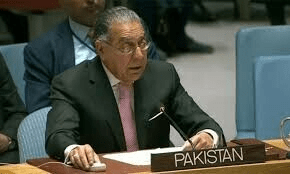IN other parts of the world, there is a flavour of the month or the restaurant which shines bright for a couple of months before falling by the wayside but here in Pakistan, our months are defined by conspiracies or scandals. There is a new one every few weeks, to our never-ending shock and horror. The negative growth rate or the mess-up in the LNG orders or the fake accounts — even so we never tire of our hand-wringing over past messes and what they cost us.
These days it is the Broadsheet saga. Musharraf and his generals in their crusade to rid Pakistan of corruption and recover looted money had signed a deal with a seemingly shady company. And later, the general and his men were forced to call off the crusade for the same reason politicians don’t pursue them ie political expediency. But poorly signed contracts and poor decision-making meant Broadsheet took the country to the cleaners by approaching the courts (outside Pakistan) and winning compensation.
And now, one of those behind this shady company is giving interviews here and there, making outrageous claims which are being taken rather seriously, as hours are being devoted to thrashing out the issue. How did we hire such a company? Why did we sign such a weak contract? Why did we dish out the award? What does it say about our flawed accountability process? So much money has been lost.
In some ways, it’s such a familiar story. But even more familiar is this chest-beating about money lost and poor decision-making that is now long past.
Why do we obsess so much over what has passed?
Why do we obsess so much over what has passed? Is it because it’s easier to dissect and criticise? Or is it because large sums of money with multiple zeros make for good shock-and-horror moments in discussions?
Perhaps it is a bit of both.
For we rarely ever expend our energies on accountability issues which are not done and dusted or don’t involve money, regardless of the fact that there are many such cases in which, seemingly, ‘NROs’ are being given.
One such story has been ongoing in the courts for months.
Three years after the brutal extrajudicial killing of Naqeebullah Mehsud, those accused of his murder seem to be close to freedom. And this in a case that was once headline news and deemed important enough for a Supreme Court intervention.
Naqeebullah, a young man in his 20s, was killed in mid-January 2018 along with three others. The police had claimed then that the four were militants but within days it was clear that the deaths had happened in a ‘fake encounter’.
Widespread protests (which ended up as the movement-that-cannot-be-named) forced the state and courts to take notice. A flurry of activities resulted in inquiries, investigations and suo motus and the main suspect, Rao Anwar, was arrested.
But three years later, as interest has waned, the case in court is going another way. Five of the key witnesses have resiled from their statements. In July of last year, sub-inspector Rana Asif and head constable Shahzada Jahangir took a U-turn. The sub-inspector had earlier stated that he had witnessed Naqeeb and the other three in police custody before the encounter. The constable had stated that he had witnessed the staged encounter. But as we coped with the first wave of the coronavirus, these two men had a change of memory in court and took back their statements.
On Oct 30, 2020, it was reported that another witness (yet another police officer) went back on his earlier statement. A month later, newspapers told us once more that police investigations of the telephone data of Rao Anwar revealed he was not in the vicinity of the area where the encounter had taken place.
Small stories, published on the inside pages of newspapers, they barely got noticed. And rightly so. There are no big sums involved, no zeros. Just four unimportant young men who would have lived lives of quiet desperation if they hadn’t run into Rao Anwar. No wonder then that all these proceedings have almost passed unnoticed.
Around 10 days ago, another effort was made to draw attention to this sleight of justice. Naqeebullah’s family and the lawyers helping them held a press conference on his third death anniversary and highlighted what was happening. His brother said the family was losing hope.
Jibran Nasir, a lawyer who is helping with the case, also spoke and pointed out that five policemen, whose testimonies formed the basis of the prosecution’s case, had retracted their statements. He added that though all of them were state employees, neither the government nor the police had taken any disciplinary action against them.
In television interviews, Nasir has also pointed out that the government has not made life easy for the policeman who has been the investigator of this case while those going back on their statements have faced no consequences so far.
It’s not hard to guess which way this story is headed. But no one seems bothered. We would rather make a hue and cry over spilt milk — the money ‘lost’ or the cost to the Pakistani taxpayer. We will never stop regretting incompetence or ill intentions in financial matters which goes unpunished. For money in our cash-strapped state matters far more than human lives.
And this is why Broadsheet gets the headlines and the airtime but not a court case in an anti-terrorism court.
Or is it because the entire ruling class understands the benefits of a police force addicted to extrajudicial killings? Everyone is a beneficiary and no one gains from discouraging this practice — except the poor citizens who are never a priority. And one can keep adding the zeros here, to the numbers of those killed but it just never becomes sexy enough or dramatic enough. The state knows what needs to be protected.
The writer is a journalist.
Published in Dawn, January 26th, 2021











































